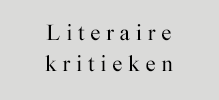Reportages
Op 7 oktober 2017 was het vijf jaar geleden dat Ivo Michiels overleed. Lars Bernaerts en Sigrid Bouset vroegen aan acht auteurs en aan zijn echtgenote om hun geliefde auteur sprekend in leven te houden.
Op zondag 8 oktober om 11 u. werd dit huldenummer van DW B ...
Alleen online: Not a Breath Wasted. Part one
11 January 2011
Dear Rick,
Our capacity for wonder is enhanced by great teachers. We both had the privilege of being taught at the University of Illinois at Urbana-Champaign, at different times, by an exceptional teacher, Robert Schneider. I retrieved Professor Schneider???s English 437 syllabus for his graduate seminar on Victorian Literature which I took, twenty-five years ago, in the Fall of 1986. About eight weeks into the course, on 28 October, we were expected to hand in a 5 page paper about George Eliot???s Middlemarch. We could write ???on the relation of moral values to social values according to the novel or on the rationale of the narrator???s ethical judgments or on the outline of history according to the novel.??? The scope and depth of Schneider???s assignment, his insistence and confidence that we should and could think and write about these matters, resembles the compass and scale of your ten novels. Schneider???s interest in big epistemological and ontological questions which are often associated with individual enquiry was always informed by an appreciation of the complex web of human interaction. Your writing strikes a similar balance between individual pursuit and the necessity for webs of interaction in order to substantiate those pursuits. Professor Schneider???s beautiful enquiring spirit explored big questions by fine attention to human passions and desires. Your novels invariably situate wonder and its heightened moments of surprised realization in the context of human encounters.
In the spirit of Schneider???s seminar, what do you make of George Eliot???s idea of wonder in this passage from Middlemarch? How would you relate it to your own work? Dorothea Brooke is falling in love with her idea of Mr Casaubon:
Miss Brooke argued from words and dispositions not less unhesitatingly than other young ladies of her age. Signs are small measureable things, but interpretations are illimitable, and in girls of sweet, ardent nature, every sign is apt to conjure up wonder, hope, belief, vast as a sky, and coloured by a diffused thimbleful of matter in the shape of knowledge. They are not always too grossly deceived; for Sinbad himself may have fallen by good-luck on a true description, and wrong reasoning sometimes lands poor mortals in right conclusions: starting a long way off the true point, and proceeding by loops and zigzags, we now and then arrive just where we ought to be. Because Miss Brooke was hasty in her trust, it is not therefore clear that Mr Casaubon was unworthy of it. (Middlemarch, Book 1, Miss Brooke, Chapter 3)
17 January 2011
Dear Heidi,
I love that you have started out this conversation with a tribute to mentors???those teachers who first nudge us out of the reassuring certainties of youth into the scary rapids of adult doubt, and those people whose long reach of wise influence we must ultimately escape if we ever hope to come back around to it and honour it in the revision. I have mentioned my debt to Robert Schneider in other places, and I???ll admit here that I???ve even paid homage to his influence by using him as the model for more than one of my fictional characters.
I, too, read Middlemarch with Schneider, although back in 1979, a few years before you did. I think it was the English novel that he admired the most, and much of that admiration formed a basis for my own later aesthetic, both as a reader and a novelist. It???s a magnificent book, full of the tensions between private desire and public accountability, idealism and practical wisdom, class and character, late Romanticism and early modernity, received wisdom and the test of experience. Almost every character in the story is capable of near-endless self-deception, and yet the process of their reversal and disillusionment is never triumphant, and the narrator always treats even their greatest foibles with a kind of understanding tenderness.
In the world of Middlemarch, moral choice is by definition ambiguous. And that ambiguity extends, marvelously, to the narrator???s treatment of Dorothea???s capacity for wonder, imagination, and idealism in this tenderly ironic scene. The whole thicket of prose is a kind of sailboat tacking back and forth: ???not less unhesitatingly,??? ???not always too grossly deceived,??? ???not therefore clear that Mr Casaubon was unworthy.??? Even the qualifications are qualified! Dorothea???s hasty trust will indeed turn out to be very definitely misplaced, and her somewhat fey wonder and girlish imagination, ???vast as a sky,??? will need correction and harsh education, many times over. And yet, and yet ??? Wonder may be a small and shaky thing, grossly outgunned and insufficient to guide us through the brutalities of life, but in Eliot???s hands, it can be made and unmade, asserted, thwarted, broken, and reassembled in a different register.
And that, too, is something I learned from Schneider: signs are small and limited, and our competing interpretations are endless. That fact, in itself, forces upon any mind that is trying to navigate the maze of moral and social values a kind of humility. And humility is, for me, the starting place of that perpetual, low-grade sense of amazement that characterizes a good-faith response to the world. Wonder, however much it borders on wide-eyed naivet??, may itself be a powerful corrective to its inverse stances???righteous and impenetrable conviction on the one hand or cynical evasion on the other.
Schneider loved to quote that most quotable of biologists, J.B.S. Haldane. He used to smile wickedly, repeating the Haldane quip about how the one thing you could know for sure about God was that he had an inordinate fondness for beetles. But he also liked that other famous Haldane observation that the universe is not only stranger than we imagine, but stranger than we can imagine. I think Eliot, in all her tender handling of human conviction and confusion would agree. Any engagement with this world should start by remembering how far it exceeds our understanding. That we humans can be filled with such passionate convictions about anything is, for me, a constant cause for wonder.
20 January 2011
Dear Rick,
Schneider???s interests, like your own, and Haldane???s for that matter, beautifully defy exclusive classification under the Dewey Decimal System. Your novels deal with a huge, diverse range of specialist areas and disciplines. Photography, History, Game Theories, Popular Culture, Genetics, Computing, Music, Medicine, Politics, Cognitive Neuroscience, Ecology all surface and resurface in your Decalogue. But like Eliot in Middlemarch, you also insist on revealing that information does not amount to knowledge. The toxic, impotent hubris which characterizes Casaubon in Middlemarch and which underlies the confusion of accumulated information with knowledge is embodied in the many characters in your novels who end up disillusioned or betrayed by their ambitions or endeavours. The tragic flaw of those characters seems to be the absence of what you referred to in your response above as ???that perpetual, low-grade sense of amazement that characterizes a good-faith response to the world.??? And that absence is related to the difficulties in their relationships, and their sexual relationships in particular. What do you make of the associations and connections between wonder, information, and knowledge?
To get the ball rolling I can???t resist another reference to Middlemarch. Lydgate???s financial distress and disappointment in his marriage leads to a blunting of his sense of wonder. Farebrother observes that Lydgate now
had none of those definite things to say or to show which give the way-marks of a patient uninterrupted pursuit, such as he used himself to insist on, saying that ???there must be a systole and diastole in all inquiry,??? and that ???a man???s mind must be continually expanding and shrinking between the whole human horizon and the horizon of an object-glass.??? That evening he seemed to be talking widely for the sake of resisting any personal bearing??? (Middlemarch, Book 7, Two Temptations, Chapter 63).
21 January 2011
Ach, Heidi: what a great quote! I had forgotten it: a systole and diastole to inquiry. The wide human horizon and the lens of the microscope. I have often thought of my own fiction as emerging out of this same ???patient, uninterrupted pursuit,??? a shuttling back and forth, between the personal and political, the intellectual and the emotional, the cortical and the limbic, the aerial view and the eye-level, the scientific and the artistic. How interesting to think that both Casaubon and Lydgate go awry, each in their own way, with very different consequences, by losing some part of this dialectical, course-correcting shuttle between the big picture and the local life.
Again, what???s interesting about Eliot is how she can chide and embrace, skewer and forgive that loss of orientation, all at the same time. When Casaubon???s Key To All Mythologies first makes its appearance in the book, Dorothea (and, I confess, I was right there cheering with her) is struck by the grandeur of the plan, the ambition, the great and laudable desire to connect everything to everything else. And then grandeur turns to grandiosity, and the attempt to connect devolves into impotent hubris.
Hubris begins in the need for certainty. We carry around with us a powerful evolutionary legacy in the form of a compulsion to certainty (see neurologist Robert Burton???s On Being Certain). It???s easy to see the survival value of not having to make your mind up again and again, about every little threat or opportunity. So it???s no wonder that the feeling can be as ecstasy-inducing and addictive as any human vice. What???s more, as information explodes beyond anyone???s ability to order let alone interpret it, the compensatory urge to comb out all that data into certain knowledge can explode just as powerfully. The dark side of the need to connect is the seductive impulse to simplify. One Key to Rule Them All: who wouldn???t want that?
But as Danilo Ki?? says, in his great book, A Tomb for Boris Davidovich: ???the reading of many books brings wisdom, and the reading of one brings ignorance armed with rage and hatred.??? And as I see it, wonder is one of the great antidotes to that rage. If hubris begins in certainty, wonder begins in doubt and ignorance. That fact is built into the multiple senses of the term, in English: not only be amazed or stand in awe, but be curious, speculate, be uncertain, as in, I wonder about that???
Wonder has to stand up to the mind-boggling proliferation of data and feel it not as a crisis, but an opportunity. I???d like to believe that faced that way, a riot of conflicting data might even help protect us from fundamentalism. The kind of science that my fiction is most in love with knows that whatever knowledge we can extract from the data will always be contingent, provisional, in need of further revision, in the light of more wondrous and irreducible new information. As the narrator of The Gold Bug Variations puts it: ???Science is not about control. It is about cultivating a perpetual sense of wonder in the face of something that forever grows one step richer and subtle than our latest theory about it.??? At least the good kind of science, the kind that can protect itself from our addiction to certainty.
This kind of provisional, perpetually revised speculation can also serve as one of fiction???s great correctives to other modes of human thought. Focalized narrative encourages a reader to read the world again from some other perspective, to play systole against diastole. And ???the information novel,??? the kind that has one foot in the realm of individuals and characters and another in the realm of larger systems and processes, can help keep this shuttling alive. When you are lost in the local, it can reconnect you with larger vistas; when you are in danger of reducing life to the schematic aerial view, it can force you back down into the messy particulars of existence at eye-level.
4 February 2011
Your paragraphs resemble the systolic rhythm of the heart, Rick. And I would very much like to hear a bit more about ???focalized narrative[s]??? which ???encourage a reader to read the world again from some other perspective??? and which ???play systole against diastole.??? Are you thinking, in some way, about the necessity of parallax as a narrative approach?
We???re just back from a week of summer holidays. Allow me also to ask for your comment on two experiences which are related to what you are talking about above. Dugal and I are reading The Little Prince at bedtime at the moment; in a conversation about where the sheep might go if it is not tied up, the pilot ventures: ???Anywhere. Straight ahead of him.??? The little prince wistfully replies: ???Straight ahead of him, nobody can go very far.??? Dugal, judging from his bush walking experience here in New Zealand, immediately remarked that this was very true. How do you think or feel about divergence (as opposed to simply straight ahead) as the way to go with our pursuits? Does George Eliot???s rhetoric of generosity, her hard won, ambivalent celebration of the Keatsian quality of Negative Capability, that capacity ???of being in uncertainties, Mysteries, doubts without any irritable reaching after fact & reason??? (Keats to George and Tom Keats, 27 December 1817) also figure in the development of your work (in addition to The Gold Bug Variations and Galatea 2.2 I???m also thinking of Plowing the Dark, The Echo Maker, Generosity)?
The second experience was Geoffrey Rush???s performance of Gogol???s Diary of a Madman at the Belvoir Theatre in Sydney. Rush???s impersonation of Poprishchin was reminiscent at times of the great mime Marcel Marceau; it injected his performance of what is essentially a massive monologue with a touch of silence. The vivid portrayal of physically apparent emotions also drew attention to the vital connection between the brain and the heart, between reason and emotion. In his delusion Poprishchin, a clerk of the ninth rank, comes to the conclusion that he is the king of Spain. He insists that, now, everything is ???clear as daylight now??? as he asserts: ???And all these confusions arise because people imagine that the human brain is inside the head. Not so. It is carried by the winds from the shores of the Caspian Sea.??? The study of the human brain and its emotional reverberations has been reinvigorated by the work of people like Robert Burton and Antonio Damasio. The geography of the brain, its ???branched thoughts, new grown with pleasant pain??? as Keats puts it in Ode to Psyche, and ???the feeling of what happens??? (the title of Damasio???s 1999 book) is very much part of the narratives in your novels. Your epigraph to Galatea 2.2, Emily Dickinson???s The Brain, could serve as picture of many of your narratives:
The Brain ??? is wider than the Sky???
For???put them side by side???
The one the other will contain
With ease???and You???beside???
Your reference to The Gold Bug Variations above takes me to the opening section of Chapter 5 which is prefaced with Francis Bacon: ???For all knowledge and wonder (which is the seed of knowledge) is an impression of pleasure in itself??? (GBV 86). Jan O???Deigh, who shares quite a few traits with Dorothea in her Bildung from information to knowledge, elaborates on the challenge of choices, the inevitability of elimination and its concurrent sense of amputative loss. Towards the end of the section she articulates her quest: ???I need to know exactly what happened to Stuart Ressler between 1957 and 1983. And only a sense of the tonal variations hidden in self-replicating molecules will lead me there??? (89). The story of Ressler???s life, the music of biology, Bach???s Goldberg Variations and the structure of DNA: tell me more about the connection between the brain and the heart in a narrative. I can???t resist leaving you today with a line from Anne Carson???s Eros the Bittersweet (1986): ???When the mind reaches out to know, the space of desire opens and a necessary fiction transpires??? (171).
Text continues in Part two.


%20the%20invisible%20XXVIII%2c%20100x80%20cm%2c%202014.jpg)



